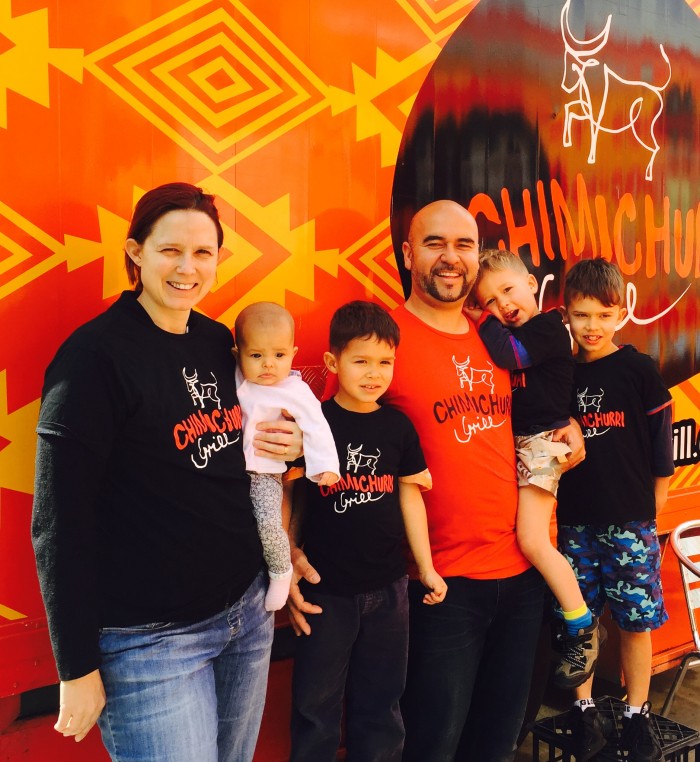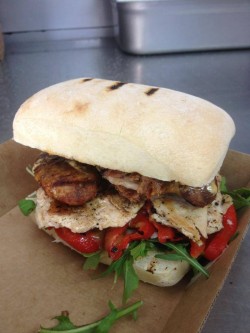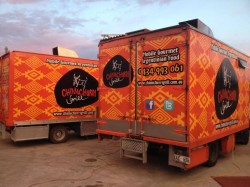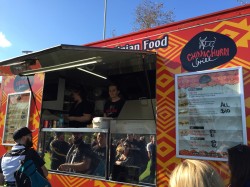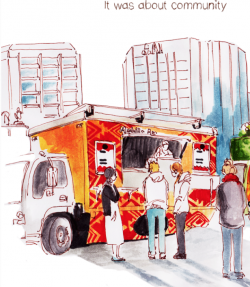Adelaide’s Food trucks are Adelaide small businesses run by real people too!
I’d like to introduce Greg and Sarah. They run the brightly coloured food truck Chimichurri Grill. A few years ago the Tillman family returned to Adelaide from interstate. They had for some time dreamt of starting their own business and as Greg had no luck finding work in Adelaide the time was right. When living in Sydney they saw a few hotdog stands and thought they could give a mobile food business a go. They wanted a lifestyle that would mean flexibility and more time with their young children.
The idea of opening a restaurant or cafe didn’t enter their minds. They knew they didn’t have the money to sign a 5 year lease somewhere and fit-out a space on a concept that they were trying for the first time and as most entrepreneurs know, might not work. At the time Burger Theory had paved the way for food trucks and Adelaide Council had just introduced mobile food vending permits as part of Splash Adelaide. So for Greg and Sarah the opportunity was there to make a food truck happen. They had access to a shed and the tools to build the truck, which Greg did with the help of family and friends. They had the right idea, time and place and they were on their way to creating a new Adelaide business, in control of their own destiny.
With a truck, they wanted to embrace flexibility. They loved the idea that food could be brought to the customers and wouldn’t be limited to one place and one audience. Whilst city trade on a weekday lunch time had direct appeal they quickly realised there could also be opportunity for work with events and catering. There were a lot of unknowns, but they wanted to create something, were willing to take a risk and were willing to try and make it work. Aren’t these the qualities of entrepreneurship and innovation that the country, state and city want from a modern economy? The opposite of the current revised rules presented by the council, which are complicated, over-regulating and will likely bring an end to food trucks in the city as we know it.
When Chimichurri Grill got started they rented a kitchen around the corner from home to do the food preparation, the truck was in the driveway and could be made ready and cleaned once the kids went to bed, talk about great multi-tasking! They enjoyed working in a variety of locations, and worked hard to develop great relationships with their customers in part through the use of social media and a strong commitment to great food and great customer service. The response from Adelaideans to food trucks has been overwhelming positive, people love eating food from Adelaide’s food trucks and they keep coming back for more.
It’s no bed of roses working in a food truck. In a fixed business you can walk in, switch on the lights on and you are ready to go. With a truck, much time is spent doing food preparation, and lugging equipment and stock in and out of the truck. The truck must be stocked up not only with food but also with water, gas, electricity etc. There are many variables to consider. You have to find an appropriate place to park. The weather, be it too hot or too cold can affect patronage and as this is fairly unpredictable it can result in the loss of stock. Events can have, large site fees and a lot of unknowns, if organisers don’t think about the match of the audience to the food, the number of vendors and the locations they place them.
From an idea a few years ago, Greg and Sarah have grown their small family business to have two trucks doing a mix of street trade, private catering and loads of events. They employ one full time staff member and up to 10 casual staff and they want to keep the business growing. They love that they have created something for themselves but also feel proud at having a knock on effect for the Adelaide economy., They buy all their produce locally, a local butcher, a local baker, they rent a space locally and they love being part of the new movement of Adelaide food trucks.
The two of them are wonderful people and generally very positive, with a mindset that always tries to make the best of things no matter what. So I was saddened to see them quite despondent about the future of food trucks in Adelaide. They’d love to continue as part of the Adelaide and South Australian food culture. For that to happen, they hope the public speaks up and responds to the current consultation period on the guidelines they feel will make it much more difficult for all the existing trucks and for anyone new out there thinking about giving it a go.
Please note these words are random collection of letters, spaces and punctuation from an individual who works on a humble food truck event in his spare time and as such has no association to the individual of the same name with a day job.


